- Details
The Arts et Métiers community in the United States joins with others who are paying tribute to one of our most distinguished alumni with exceptional career achievements, Louis Magne (An 130).
This loss is most acutely felt here in the United States where he has been living for many years, as well as in France where the residence for students on the campus of Angers was named after him. Louis Magne shared his faith in younger generations broadly. He helped them follow in his foot steps and add an American experience to their Gadz’Arts foundation. He remained close to his alma mater through his long life. Louis Magne’s grant supported many young Gadz’Arts coming to the United States to study in the best American Universities and will continue in the future.
AFAM’s work would not have been as successful if it wasn’t for the continuous support of Louis Magne. His sizable grant to AFAM helped expand our programs across the United States for Arts et Métiers alumni and students alike. We are grateful for his generosity. Louis Magne lived a life of leadership and service and will be remembered.
Louis Magne was born in St. Pierre de Frugie, in the Aquitaine region, near Dordogne, France, in 1912, he graduated in 1935 and joined Schlumberger as a field engineer. After some training in Rumania, Magne started his career in Venezuela working in Lagunillas for Shell, on land. Then he continued in Trinidad. Magne had met Conrad Schlumberger in person in Paris for an interview.
In the 60’s Louis Magne was Executive Vice President of Schumberger Overseas in Paris. Roland Genin was his assistant as VP Operations.
In 1967 Louis Magne was elected President of Schlumberger Surenco in Caracas, Venezuela. Magne remained in Caracas until December 1970, when he moved back to Houston for Schlumberger Limited. From 1972 to 1977 Magne was President of Schlumberger Wireline North America.
Louis Magne retired in Houston, Texas, where he maintained a socially active life with his close friends until nearly reaching the age of 107. He died in the morning of October 29, 2019.
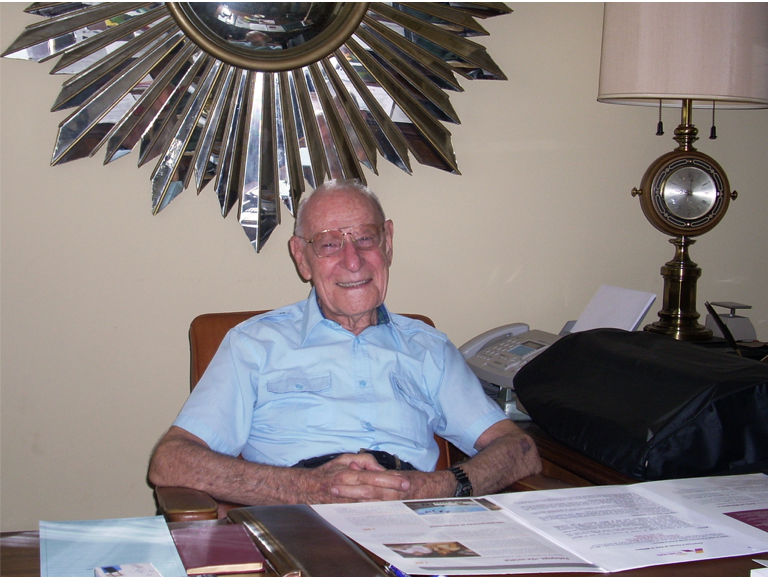
Photo: Courtesy of Arts et Métiers
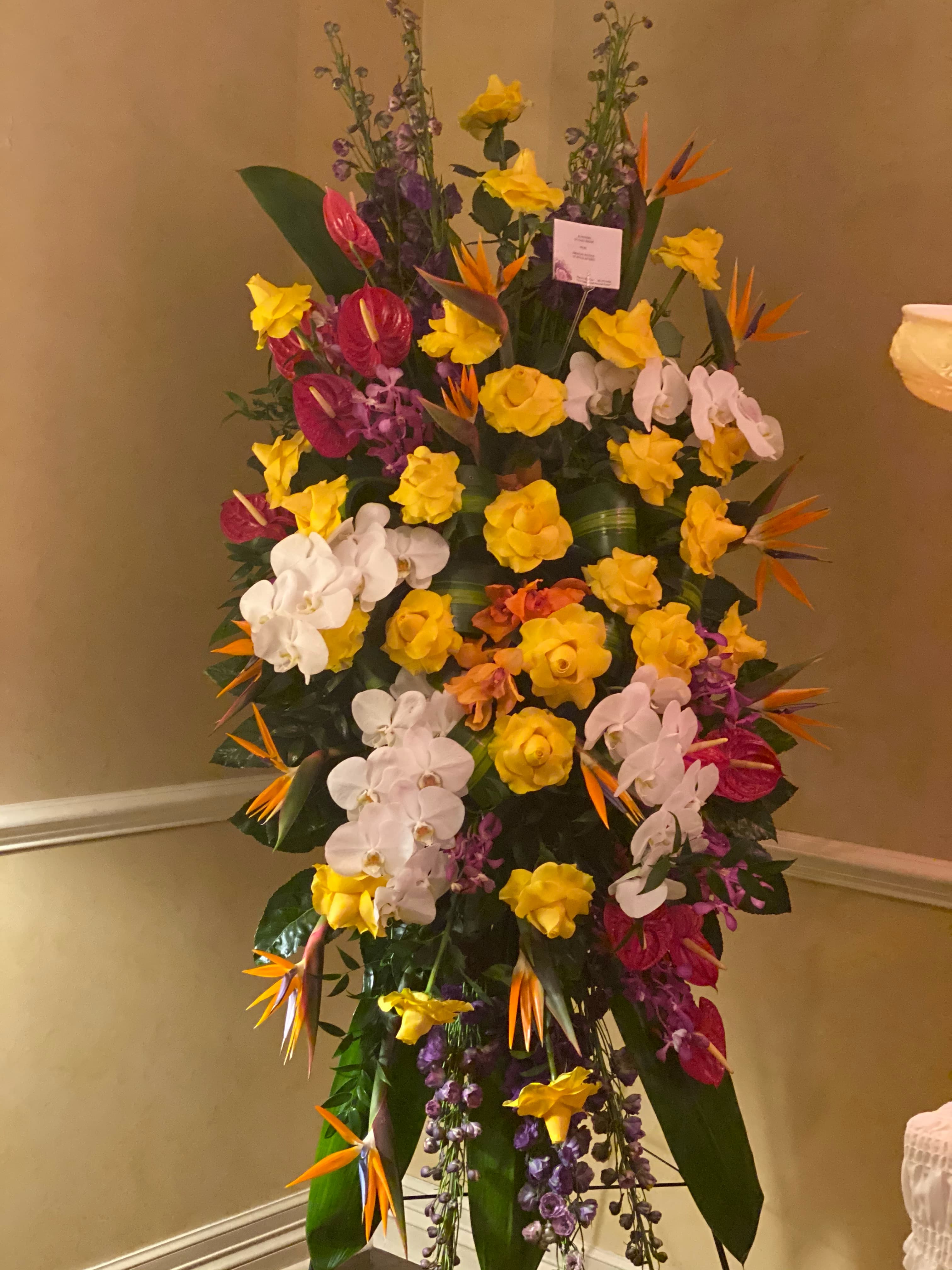
Flowers on behalf of AFAM in memory of Louis Magne at a funeral ceremony in Houston. A small group of gadzarts based in Houston led by Eric Tran, Central Group president, was present to say goodbye to the Grand Gadzart.
- Details
AFAM continues its "Food for Thought" interview series. Our next guest is Guilhem Bau, a Cl 215 alumnus and Georgia Tech Graduate, currently a Machine Learning Engineer at Blendid.
Blendid is a young startup company founded in 2015 in SF Bay Area. The company offers healthy on the go food (smoothies) "combining creativity of a chef with precision of a robot".
AFAM: What do you do on a daily basis for your job?
Guilhem: I usually work on diverse tasks that could be related to recommendation system, computer vision, mechatronics or operation management. I usually switch from one to the other during the day. The best part would definitely be recipe testing!
AFAM: Is working for a Food Company your initial choice or a coincidence?
Guilhem: It's actually a coincidence, the food industry was appealing to me but I was primarily looking for a tech position so a tech job in a food company was a great match
AFAM: What makes a company you work for unique?
Guilhem: We are a startup creating fully autonomous smoothies kiosk. As we are one of the first company to develop such kiosks it makes it pretty unique and different from other traditional food companies.
AFAM: Did the fact of being French help you get where you are now?
Guilhem: It's definitely helped to get the chance to receive high quality education in France. AFAM and the French community were also very helpful! I also assume that French Engineers have a good reputation in the Silicon Valley.
AFAM: What can you say about Food Industry in general in the US, how is it different from that in France? Any thoughts?
Guilhem: As I never worked in the food industry in France, it's hard to compare. I would say that the food industry in the US has a lot to offer, it has a wide range of products, standards and opportunities.
AFAM: Thank you, Guilhem, for sharing!
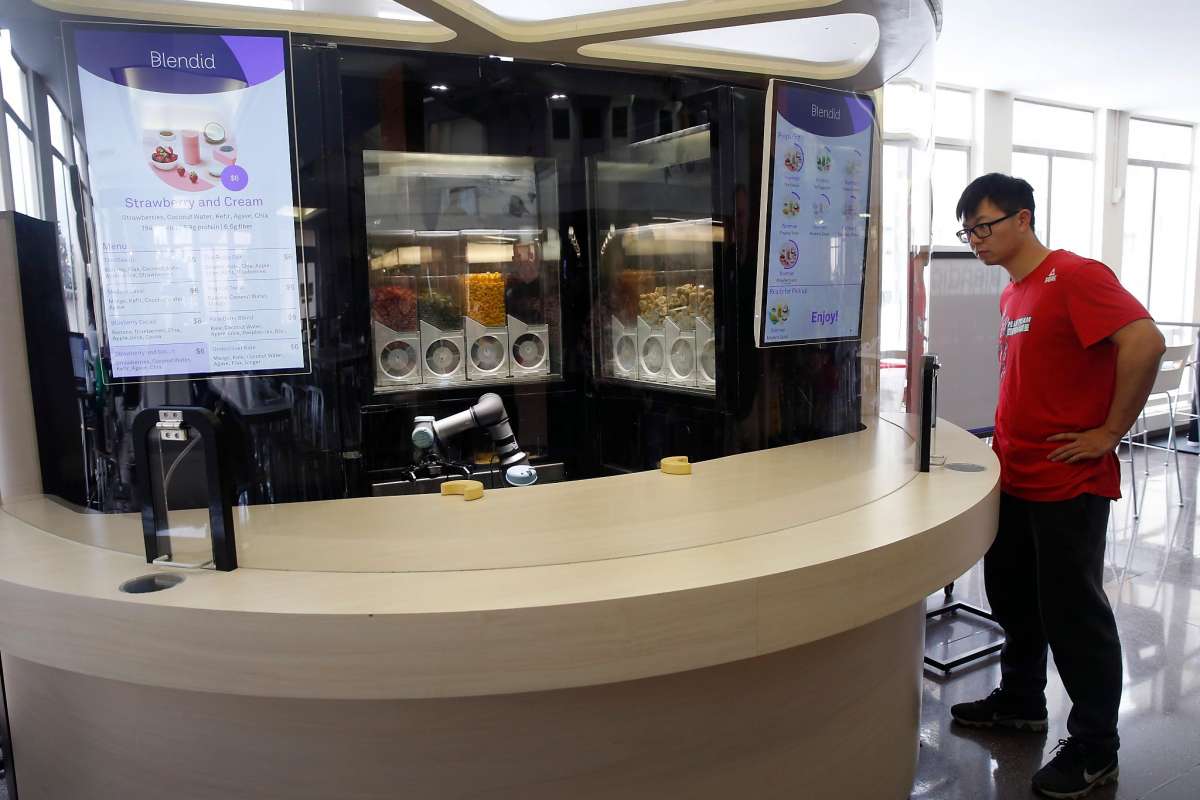
Photo: Paul Chinn for the Chronicle - Blendid kiosk at the USF campus
Curious about the smoothies robot? More info on our website https://www.myblendid.com/
Read other interviews in our "Food for Thought" series:
- Details
This Fall AFAM is launching its “FOOD FOR THOUGHT” interview series.
“FOOD FOR THOUGHT” is a way to unveil and understand what is behind some engineering jobs in the Food/Agriculture Industry in the US. AFAM has no intention of analyzing this big and complex industry but wants to gain some understanding of what it is to be an engineer in the Food sector, what opportunities it might open up and skills it requires.
Above all, “FOOD FOR THOUGHT” is a great way of getting acquainted with our diverse and vibrant gadz community in the US!
Our first interviewee is....Jérémy Berros (Li 206), Battery Tools Director, North America, at PELLENC Group
AFAM: Hello, Jérémy, and thank you for taking the time to share your expertise with our blog readers. Your job title is Battery Powered Tools Director for North America at PELLENC Group. What does it mean exactly and what do you do in a daily basis for your job?
Jérémy: I am the Head of the activities involving a full range of Lithium-ion Batteries for various applications in the Vineyards, Agriculture and Green Space markets at PELLENC America. Energy storage and portability is one of the great challenges of the global economy. PELLENC is one of the leaders in the Winegrape Industry from the Vineyard to the Winery. My main focus is developing the business of the company in North America especially in fields and territories with the most potential like Canada and the USA. My day to day job consists of developing our footprint, brand visibility, sales and services through our California-based offices, our network of distributors, dealers and agents, our E-Commerce platform for online sales. Back office tasks are also involved such as inventory management, interfacing with the HQ in France. For example, in the next couple of months I will be traveling to the East Coast, South-East, Great Lakes Region and British Columbia Area to find new dealers, new agents, meet with customers and attend trade shows.
AFAM: Is working for a Company specialized in Agriculture and Wine your initial choice or a coincidence?
Jérémy: Before coming to the US back in 2016 I worked in France in the oil and gas, energy and chemical industries for almost 8 years and have gained a solid experience in Engineering Management, Project Management and Business Development with Key Accounts like TOTAL, EDF, VEOLIA or TECHNIP.
After graduating from the University of Florida in 2009, I always wanted to come back to live and work in the US. The US was more in line with my mindset in terms of doing business and professional interactions. I loved the entrepreneurial spirit in the US as well as the way American businesses interacted. For several years I have been applying for the green card which was finally granted and that was the beginning of the story.
When I arrived in the US, I had the opportunity to start working in agricultural industry. By that time, I was leaning towards business after my MBA at Sorbonne University, completing my technical background, and I started as a Technical Sales Engineer before my position as Business Development Director at MAF RODA.
MAF RODA is a French family-owned Group with international dimensions. MAF RODA is specialized in grading, packing and handling fresh fruit and vegetables using Artificial Intelligence and Computer Vision for External and Internal Defect sorting.
AFAM: What makes the company you work for unique?
Jérémy: PELLENC Group is specialized in the wine business and most of its revenue comes from the Wine Grape unlike some of our competitors for harvester and machinery like John Deere and New Holland which are providing solutions across a lot of industries including main crops (corn, wheat and soybeans...). Today the Group is also exploring other markets such as fruit tree (citrus, stone fruit, cherry, nuts…) business. It is amazing to be able to initiate technology transfer to disrupt or at least transform an industry.
Business-wise, the wine industry is well-known to stay strong and consistent throughout the ups and downs of the economy. Wine is a pretty good market to be in with great people and a stimulating environment.
AFAM: Did the fact of being French help you get where you are now?
Jérémy: To get where I am.. not really - doing business in the US is different from Europe. Being French gives a kind of authenticity from the “old continent” when you are in a Wine Business. But there is the flip side to that coin. The European market is not open to American wines and there is a lot of push back which can generate frustration and defiance from US Producers. When I was working in the Central Valley of California, I felt like an outsider at first. For generations, American Farmers have been in the Agricultural business. It is a very conservative Industry and you have to prove that you bring better value than the “locals”. At the end of the day, American Farmers and Winemakers are very pragmatic. Therefore, when you show that you can provide a real solution to their problem with consistent service and support, you get your customers’ confidence.
But having the ability to work in several areas with different people is truly a great experience. Just talking about California between Central Valley having local farmers, producers, packers with traditions and core values and the Bay Area having innovative startups in Palo Alto and international people from all over the world. It is an amazing environment to learn from both worlds and even bridging the gap between them using, for instance, Artificial Intelligence in Agriculture.
AFAM: What can you say about Wine and Agriculture Industry in general in the US, how is it different from that in France? Any thoughts?
Jérémy: Real Estate is a major difference. When on average producers in France have 10s or of 100s acres of lands, farmers in the US have 100s or 1000s of acres. This scale difference implies different tools, resources and organizations. Besides that, most of the Agricultural Labor is Mexican and Labor Shortage has started to become an issue due to recent conservative immigration policies. On the top of that, the minimum wages increase is giving more traction to Mechanization and Automation which brings opportunities to PELLENC. It will be also more difficult for small and medium companies in the US to survive. A concentration of players is inevitably happening to allow them to stay competitive in such market. This transition is happening right now and it will be supported by such companies as PELLENC Group. This is a very exciting time and an amazing place to do business in this Industry.
AFAM: Thank you, Jérémy, for sharing!
Five facts you did not know about US Wine and Grape Industry:
- Total S. Wine Market Tops $70 Billion. U.S. #1 consumer and #4 producer worldwide.
- The top four wine producers are California (with 3724 wineries), Washington (with 681 wineries), Oregon (with 599) and New York (with 320)
- Grapes are the highest value fruit crop in the US
- Baby boomers, who control 70 percent of US discretionary income and half of the net worth in the US, are moving into retirement and declining in both their numbers and per capita consumption.
- The harvest of 2018 was of high quality in virtually all growing regions in the US, with the exception of Virginia, where hurricanes made for a disastrous season, and, to a lesser extent, New York, which also had heavy rain to contend with.
Sources: svb wine report 2019 and wineamerica.org

Photo: Courtesy of Jérémy Berros
Other interviews in our Food for Thought series:
Interview with Guilhem Bau (Cl 215), Blendid
- Details
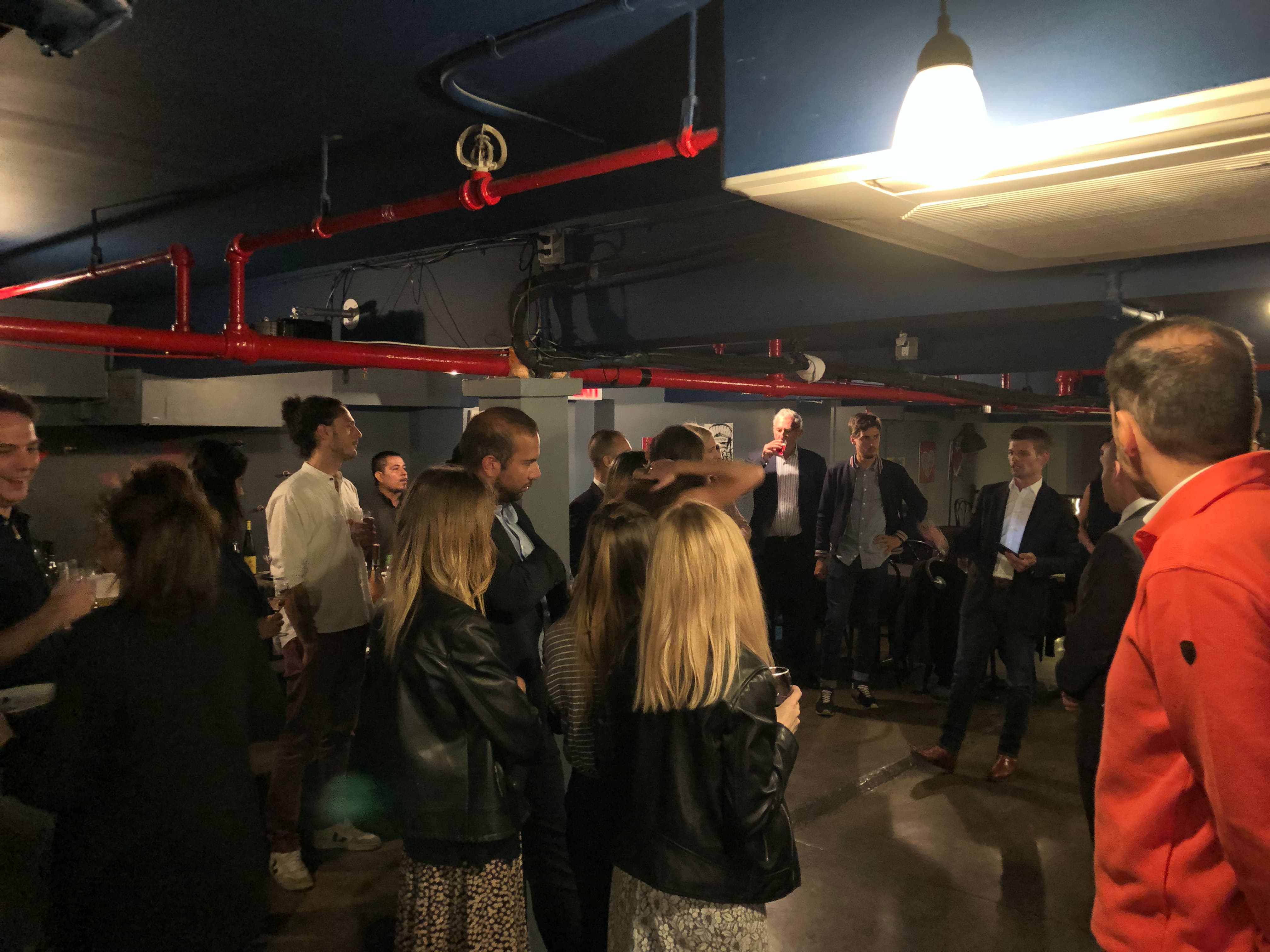
- Details
Parcours US is one of the most popular international programs at Arts et Métiers. This year 26 students have been admitted to American Universities out of 28 "Parcours US" candidates. For the next year the school has already received 60 requests for being a part of this program with only 36 available places.
The school has signed several agreements with Graduate Engineering Schools in the US, such as Georgia Tech, UC Berkeley, Texas A&M, Texas Tech to mention a few. Traditionally, most of our students choose to go to Georgia Institute of Technology and University of Berkeley as SF and Atlanta are very attractive cities with a lot of opportunities.
On September 7th new students based in the Bay Area gathered together on the initiative of Mattia Pelissou, Berkeley alumnus himself who works now for one of SF startups.
Welcome to the Bay Area and good luck to our students!
See you soon!
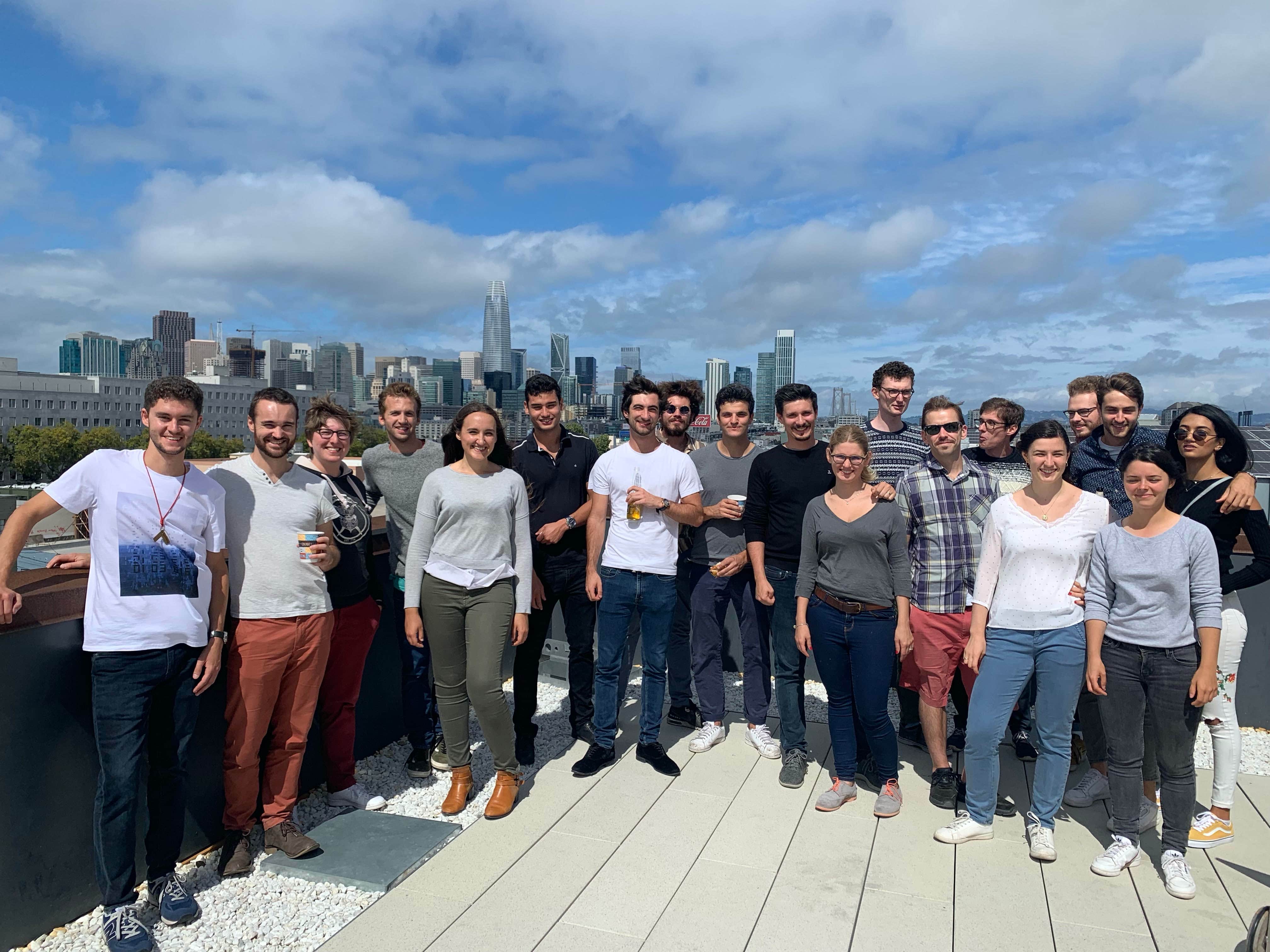

 BLOG /
BLOG /  CALENDAR /
CALENDAR /  DONATIONS /
DONATIONS /  MENTORS /
MENTORS /